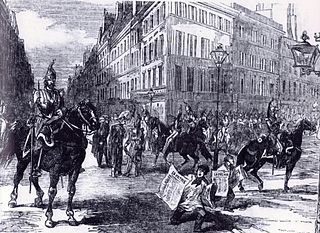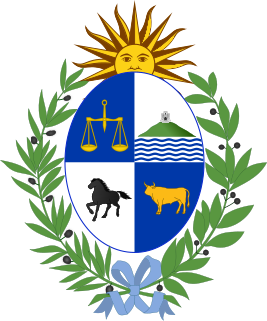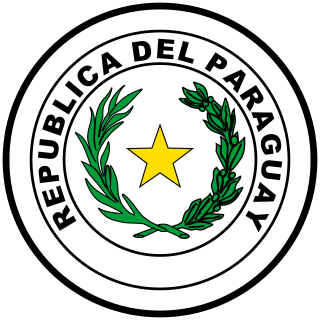 |
|---|
The fourth Constitution of Uruguay was in force between 1942 and 1952.
Contents
Approved in a referendum on 29 November 1942, it replaced the previous constitutional text, which had been in force since 1934.
 |
|---|
The fourth Constitution of Uruguay was in force between 1942 and 1952.
Approved in a referendum on 29 November 1942, it replaced the previous constitutional text, which had been in force since 1934.
President Alfredo Baldomir summoned a Council of State which drafted the new text. It is considered a minor reform to the previous constitution, its main change being the suppression of the "15+15"-Senate, replaced by a more traditionally elected one.
This Constitution was in force for a decade.

The Constitution of Ireland is the fundamental law of Ireland. It asserts the national sovereignty of the Irish people. The constitution, based on a system of representative democracy, is broadly within the tradition of liberal democracy. It guarantees certain fundamental rights, along with a popularly elected non-executive president, a bicameral parliament, a separation of powers and judicial review.
A constitutional amendment is a modification of the constitution of a polity, organization or other type of entity. Amendments are often interwoven into the relevant sections of an existing constitution, directly altering the text. Conversely, they can be appended to the constitution as supplemental additions, thus changing the frame of government without altering the existing text of the document.
Dictablanda is a dictatorship in which civil liberties are allegedly preserved rather than destroyed. The word dictablanda is a pun on the Spanish word dictadura ("dictatorship"), replacing dura, which by itself is a word meaning "hard", with blanda, meaning "soft".

A self-coup, also called autocoup, is a form of coup d'état in which a nation's leader, having come to power through legal means, tries to stay in power through illegal means. They might dissolve or render powerless the national legislature and unlawfully assume extraordinary powers not granted under normal circumstances. Other measures taken may include annulling the nation's constitution, suspending civil courts, and having the head of government assume dictatorial powers.

The current Constitution of Ireland came into effect on 29 December 1937, repealing and replacing the Constitution of the Irish Free State, having been approved in a national plebiscite on 1 July 1937 with the support of 56.5% of voters in the then Irish Free State. The Constitution was closely associated with Éamon de Valera, the President of the Executive Council of the Irish Free State at the time of its approval.
The Fourteenth Amendment of the Constitution Act 1992 is an amendment to the Constitution of Ireland which specified that the protection of the right to life of the unborn does not limit the right to distribute information about services in foreign countries. It was approved by referendum on 25 November 1992 and signed into law on 23 December of the same year.

Alfredo Baldomir Ferrari was a Uruguayan soldier, architect and politician. He served as President of Uruguay from 1938 to 1943 and is most notable for leading Uruguay to support the Allies during World War II.

Gabriel Terra Leivas was a Uruguayan politician and lawyer who served as president of Uruguay from 1931 to 1938.

The Constitution of Uruguay is the supreme law of Uruguay. Its first version was written in 1830 and its last amendment was made in 2004.

The Constitution of Australia is a constitutional document that is supreme law in Australia. It establishes Australia as a federation under a constitutional monarchy and outlines the structure and powers of the Australian government's three constituent parts, the executive, legislature, and judiciary.

The National Council of Government was the ruling body in Uruguay between 1952 and 1967. It consisted of nine members, of which six were from the party that received the most votes in general elections, and three from the runner-up party. Generally known as the colegiado system, it had previously existed as the National Council of Administration between 1918 and 1933.

The Republic of Paraguay is governed under the constitution of 1992, which is the country's sixth since independence from Spain in 1811.

General elections were held in Uruguay on 28 March 1938. The result was a victory for the Colorado Party, which won a majority of seats in the Chamber of Deputies and received the most votes in the presidential election, in which the Alfredo Baldomir faction emerged as the largest. Baldomir subsequently became President on 19 June.

A constitutional referendum was held in Uruguay on 29 November 1942, alongside general elections. The new constitution was approved by 77.17% of voters.

The 1997 Constitution of Uruguay refers to the 1967 Constitution with amendments.

The sixth Constitution of Uruguay came into force in 1967.

The fifth Constitution of Uruguay was in force between 1952 and 1967.

The third Constitution of Uruguay was in force between 1934 and 1942.

The second Constitution of Uruguay was in force during the period 1918–1933.

Uruguay remained neutral for most of World War II. The policy of President Alfredo Baldomir, leading the Colorado Party, was to support the Allied cause, but from a neutral base. Great Britain retained considerable influence with the Baldomir regime, largely through the efforts of Sir Eugen Millington-Drake, who was the British Minister in Montevideo from 1934 to 1941. In January 1942, Baldomir terminated diplomatic relations with the Axis powers. He resigned in 1943 and his neutrality policy was continued by his successor Juan José de Amézaga, also of the Colorado Party. In February 1945, having signed the Declaration by United Nations, Amézaga declared war on Germany and Japan.